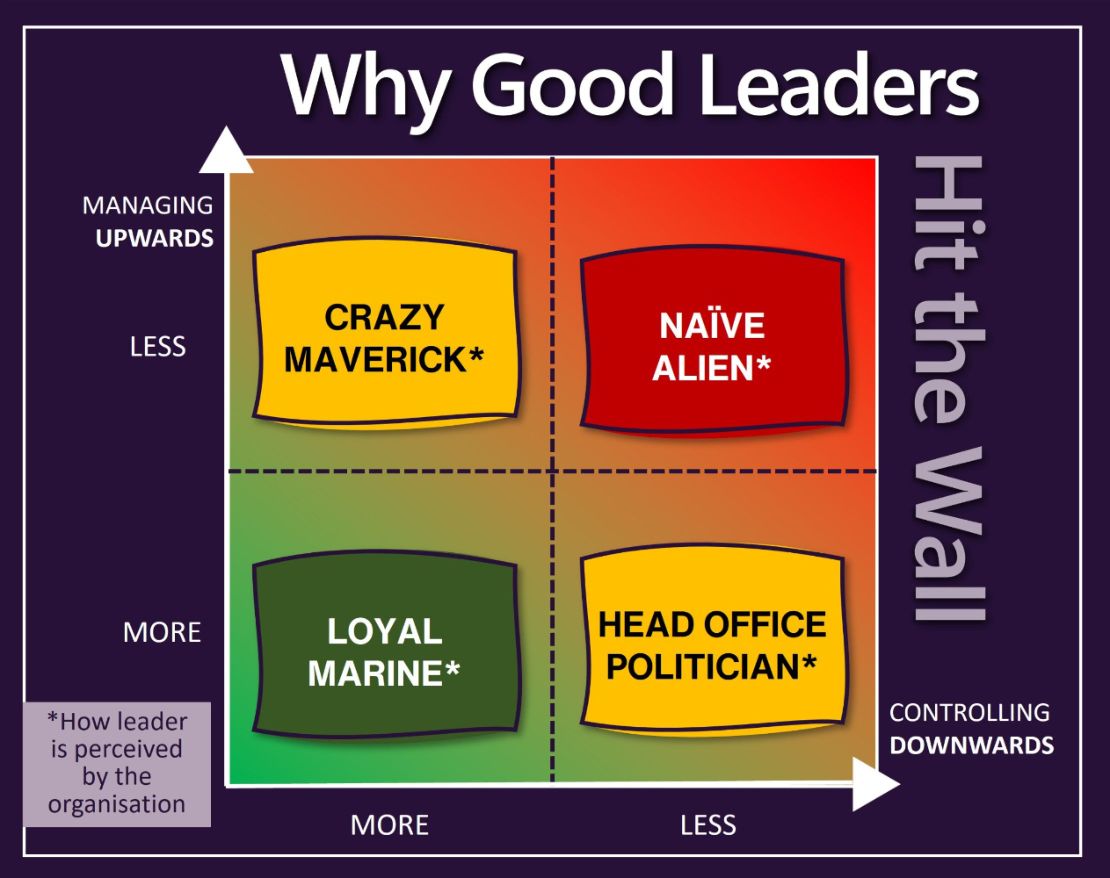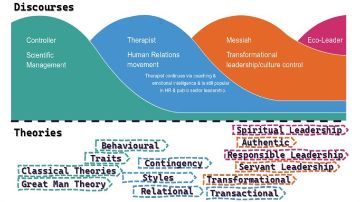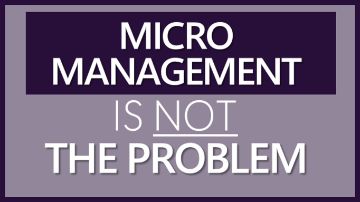
Have you ever noticed that those few leaders who earnestly seek to develop themselves and their teams often get frustrated, give up and leave? In spite of everybody crying out for more “agile”, “empowering” and “responsible” leaders?

Why are good leaders hitting the wall in traditional organisations? Have you ever noticed that those few leaders who earnestly seek to develop themselves and their teams often get frustrated, give up and leave? In spite of everybody crying out for more “agile”, “empowering” and “responsible” leaders? I will suggest the challenge is systemic: the maturity of an organisation can never transcend the maturity of its leaders… and its teams.
In fact, when senior leaders in traditional organisations start to yield positional power, their environment will often respond in a hostile fashion. And that is no surprise! We expect leaders to be “loyal marines”, always in control and ready to execute. The necessary ambiguity of shared leadership — often not helped by the lack of well-articulated processes, absence of collaboration cultures and misaligned incentives — is often highly problematic. Moreover, when such collaborative leaders enter the scene, traditional power holders are sorely reminded of the illegitimacy of their feudal behaviours. Which very frequently, let’s say it diplomatically, is rather unwelcome…
But in my experience the problem is not only one of corporate antibodies: initial skepticism often becomes self-fulfilling prophecy.
- If leaders readily yield their positional power, they can be perceived by their own units as manipulative and removed from day-to-day operations (“head office politicians”), or as “naive aliens” who break unwritten rules and pursue idealistic phantasies whilst being unable to play the corporate game. As a result, teams are often on the fence. But when followers are unwilling or not ready to accept newly gained ownership, chaos and lack of accountability are certain to ensue. Soon, leaders are perceived by their bosses as out of control and not “on top of their game”, with obvious consequences.
- But even if successful in creating “downward” engagement, trouble looms “upwards”. If leaders stop defending their “turf”, seeking to inspire their peers to follow a more collaborative paradigm (“we are all in this together”), they will quickly find themselves sidelined by colleagues who master a zero-sum political career game. Moreover, at the first mishap or mistake, skeptics will openly demand abortion of all heretical experiments, if not the experimenter’s head. Thus, when leaders seek to raise above their context, they will often get themselves into deep trouble. (Not even to mention legal and regulatory requirements to maintain concise and transparent delegations of authority.) Without the most senior sponsorship (read: the CEO) many progressive leaders will ultimately surrender and leave for pastures new, or to set up their own consultancies and coaching practices — to help others avoid their own mistakes.
Secondly, leaders themselves must be willing to reframe their own roles: a shift towards systemic leadership requires us to enact the whole, rather than insisting on our own part. From managing in the system we move to the management of the system and eventually embody the system itself. This requires not only the acquisition of new skills, but also identity work. We often speak about “letting go of authority”, but that only defines what we lose, not what we gain. Leaders need to find new identity “anchors” in order to tap into the motivation and commitment needed to embrace a new role. And this is not easy — even when leaders empower others, they often continue to draw their solid sense of identity from their own power and status — we all have invested emotional capital into “being someone”.
In a nutshell, we must be careful to ingenuously demand the installation of “new leadership” paradigms. Only when both leaders and followers, and the organisation as a whole, are truly ready and willing to embrace shared power, can such shared leadership truly flourish…
#leadership #goodorganisations #transformation #agile #Unitedforgood #systemsthinking
Why are good leaders hitting the wall in traditional organisations? Have you ever noticed that those few leaders who earnestly seek to develop themselves and their teams often get frustrated, give up and leave? In spite of everybody crying out for more “agile”, “empowering” and “responsible” leaders? I will suggest the challenge is systemic: the maturity of an organisation can never transcend the maturity of its leaders… and its teams.
In fact, when senior leaders in traditional organisations start to yield positional power, their environment will often respond in a hostile fashion. And that is no surprise! We expect leaders to be “loyal marines”, always in control and ready to execute. The necessary ambiguity of shared leadership — often not helped by the lack of well-articulated processes, absence of collaboration cultures and misaligned incentives — is often highly problematic. Moreover, when such collaborative leaders enter the scene, traditional power holders are sorely reminded of the illegitimacy of their feudal behaviours. Which very frequently, let’s say it diplomatically, is rather unwelcome…
But in my experience the problem is not only one of corporate antibodies: initial skepticism often becomes self-fulfilling prophecy.
- If leaders readily yield their positional power, they can be perceived by their own units as manipulative and removed from day-to-day operations (“head office politicians”), or as “naive aliens” who break unwritten rules and pursue idealistic phantasies whilst being unable to play the corporate game. As a result, teams are often on the fence. But when followers are unwilling or not ready to accept newly gained ownership, chaos and lack of accountability are certain to ensue. Soon, leaders are perceived by their bosses as out of control and not “on top of their game”, with obvious consequences.
- But even if successful in creating “downward” engagement, trouble looms “upwards”. If leaders stop defending their “turf”, seeking to inspire their peers to follow a more collaborative paradigm (“we are all in this together”), they will quickly find themselves sidelined by colleagues who master a zero-sum political career game. Moreover, at the first mishap or mistake, skeptics will openly demand abortion of all heretical experiments, if not the experimenter’s head. Thus, when leaders seek to raise above their context, they will often get themselves into deep trouble. (Not even to mention legal and regulatory requirements to maintain concise and transparent delegations of authority.) Without the most senior sponsorship (read: the CEO) many progressive leaders will ultimately surrender and leave for pastures new, or to set up their own consultancies and coaching practices — to help others avoid their own mistakes.
Secondly, leaders themselves must be willing to reframe their own roles: a shift towards systemic leadership requires us to enact the whole, rather than insisting on our own part. From managing in the system we move to the management of the system and eventually embody the system itself. This requires not only the acquisition of new skills, but also identity work. We often speak about “letting go of authority”, but that only defines what we lose, not what we gain. Leaders need to find new identity “anchors” in order to tap into the motivation and commitment needed to embrace a new role. And this is not easy — even when leaders empower others, they often continue to draw their solid sense of identity from their own power and status — we all have invested emotional capital into “being someone”.
In a nutshell, we must be careful to ingenuously demand the installation of “new leadership” paradigms. Only when both leaders and followers, and the organisation as a whole, are truly ready and willing to embrace shared power, can such shared leadership truly flourish…
#leadership #goodorganisations #transformation #agile #Unitedforgood #systemsthinking
Popular articles in the KnowledgeHub: Good Leadership





 .
.